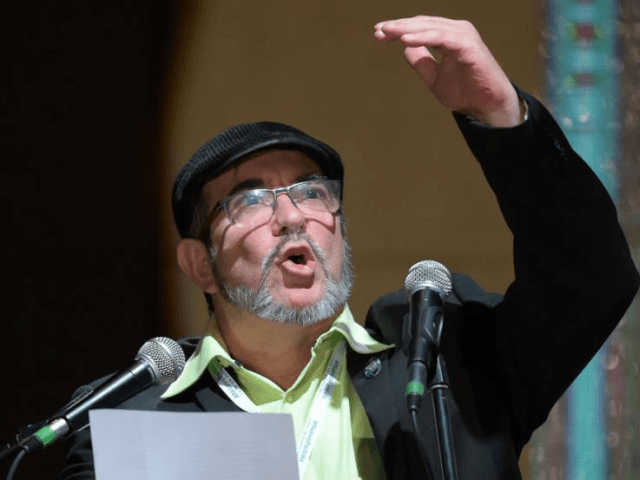The narco-terrorist group FARC has announced that it has nominated its leader Rodrigo Londoño (alias “Timochenko”) to run for president of Colombia in 2018.
The FARC have the privilege of operating as a legal political party in Colombia thanks to the effort of President Juan Manuel Santos, who won the 2016 Nobel Peace Prize for forcing the Colombian people to accept a “peace deal” with the terrorist organization that grants many of its thousands of members immunity from criminal prosecution after the nation voted “no” to the deal in a referendum.
At the time, President Barack Obama called the “peace deal” an “historic achievement,” while Santos has said he hopes the deal will be a model for the rest of the world on how to deal with terrorists.
The Revolutionary Armed Forces of Colombia announced that they would rebrand as the “Revolutionary Alternative Common Force” party in September, keeping the famed acronym. The FARC peace deal grants them ten uncontested seats in the Colombian Congress through 2026 and the right to nominate presidential candidates, like any other political party.
The FARC is responsible for at least 220,000 deaths and an estimated 100,000 “disappearances” since its establishment in 1964 as a Marxist terrorist insurgency and remained through this decade the wealthiest non-Islamic terrorist group in the world. It boasts an extensive record of crimes against humanity that includes murder, rape, use of child soldiers, forced abortions on minors, abductions, and torture.
Nevertheless, the FARC proudly announced on Wednesday that Londoño would represent them in the 2018 presidential election, despite facing at least 13 convictions and a total of 448 years in prison for homicide, terrorism, and other crimes.
Timochenko’s vice presidential pick is Imelda Daza Cote, a FARC terrorist who spent two decades as a fugitive in Sweden.
The FARC also listed the privileged terrorist leaders who will take the uncontested Senate seats and announced a slate of candidates for the lower chamber of Congress, who would have to win their seats against other candidates.
“The common people and all those who dream of a new nation will have their proper representation and be able to count on an alternative politics to dispute the presidency,” the FARC said in its statement. “Good people seek to end the corruption impoverishing the nation; they also demand the reorientation of the economic model that allows the recovery of productive capacity, the dignity of work, and attention to the most urgent needs of the population regarding education, health, shelter, social security, culture, and infrastructure.”
Curiously, the FARC made an appeal to the nation’s rural interior, saying, “Our peasants, our ethnic peoples and rural communities”—the same people who overwhelmingly voted “no” to a peace deal with terrorists. As the Colombian newspaper El Tiempo highlighted at the time, Planadas, the village known as the cradle of the FARC, and La Tebaida, Timochenko’s hometown, both voted “no” in large numbers to the peace deal.
Reuters notes that the FARC have yet to address how candidates like Timochenko could properly govern when facing serious criminal convictions or waiting to be processed for their crimes by a specially designated FARC tribunal, as the “peace deal” requires. While the “peace deal” does not allow for imprisoning FARC terrorists whose crimes fit the ill-defined category “political crime,” many will still have to engage in community service projects like demining communities heavily booby-trapped by the FARC.
Under the special FARC tribunals, all terrorists must hand over their weapons and await sentencing for their crimes, which fall under either the political crime category or “crimes against humanity.” Those found guilty of the latter category of crime may face a prison sentence.
The government has not clarified what it will do for those already convicted of crimes, like Timochenko. Timochenko, according to various media outlets including El Espectador and Vanguardia, is facing at least 117 orders of capture for crimes such as the abduction and murder of former Colombian Minister of Culture Consuelo Araujo Noguera; the abduction of congresswoman Consuelo González de Perdomo; the abductions and murders of former Antioquia governor Guillermo Gaviria and minister Gilberto Echeverri; and several bombings.
Timochenko has also been prosecuted for recruitment of child soldiers and organizing village raids and attacks on police stations.
Santos’ government lifted various arrests orders on Timochenko in 2015 to make it legal to conduct peace talks with him. By 2015, Timochenko had fled to Havana, Cuba, which has long supported FARC terrorism.
Iván Márquez, a high-ranking FARC terrorist, said this week that the group is working on the “final details” of getting Timochenko back into Colombia and legally able to run a presidential campaign. The FARC claim that Timochenko recently suffered a stroke and is being cared for by Cuban doctors.
Should Timochenko win, it would not be the first example of a former Marxist guerrilla member becoming the head of a Latin American state. Leftist former Brazilian president Dilma Rousseff was once a member of the “National Liberation Command,” a Marxist guerrilla. As president, she presided over the country during two of the largest corruption scandals in the history of the nation: what is known as “Operation Car Wash,” the use of the state-run oil company Petrobras to personally enrich dozens of Brazilian politicians; and the related Odebrecht scandal, in which the Brazilian conglomerate bribed politicians throughout the continent for lucrative government contracts.

COMMENTS
Please let us know if you're having issues with commenting.